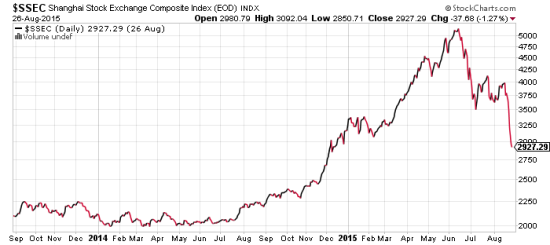
How Do I Know If We’re Due For A Stock Market Downturn?
by Crista Huff, August 27, 2015
Stock markets experience downturns, a.k.a. corrections, for varied and specific reasons.
-
Changes in related financial markets and economies — including interest rates, commodity prices, currency values, et. al. — can easily cause changes in stock market pricing.
-
Sudden emotional and/or expensive events, such as natural disasters, acts of war, or deaths of key heads of state, can cause stock market downturns.
-
Frenzied investor gambling behavior can cause rapid increases and decreases in the prices of individual stocks, market sectors, and/or overall market indices.
Some stock market downturns are not very foreseeable; others can be seen coming from afar. The two easiest-to-spot causal factors to stock market downturns are overvalued markets and overextended markets. These two types of stock market circumstances can occur simultaneously, or they can occur independently of each other.
Sign up to receive my free stock-investing newsletter! —>>
An overextended market is a stock market which has risen rapidly in a short time frame; or perhaps it has risen a lot over a longer time frame, without experiencing any consequential price correction.
Investors can assess an overextended market by viewing a stock chart, or by calculating the market’s percentage increase. (Some people are more visual; others are more numerical.)
Imagine a stock chart slanting up dramatically to the right. That’s an overextended chart. We had a beautiful example of such a market in China, this year. Look at the two-year chart, below, of the Shanghai Stock Exchange (SSEC). Do you see that the SSEC was trading sideways for a year, leading into a 150% price run-up over the next nine months?
People wonder why the China stock markets fell. It wasn’t voodoo, folks. ALL investments that rise 150% in nine months morphed from investments into gambles at about the 20% mark.
It is unrealistic to expect any investment to rise an obscene amount, without subsequently falling. That fall is referred to as a correction. Whether you’re looking at charts of entire markets — stocks, bonds, metals, commodities — or charts of individual stocks, it is safe to assume that if the investment rose an unrealistically large amount recently, the chart is overextended, and the investment carries a lot of price risk.
(continue below chart)
Chart courtesy of StockCharts.com.
* * * * *
An overvalued market is a stock market in which the price/earnings ratios (PEs) are, on average, higher than the companies’ earnings per share* (EPS) growth rates.
Most of my readers are investors who manage their own stock portfolios. Investors can assess an overvalued market in this way: if you’re having a hard time finding stocks to buy that have current PEs lower than this year’s projected EPS growth rate, then you’re looking at an overvalued market. (I am presuming that when you screen potential stock investments, you start with EPS growth, because that is the highly successful approach that I take. If you’re screening stocks for other characteristics that take higher priority over EPS & PE — share price, debt levels, products, etc. — then this method of determining overall market valuation will not be as helpful for you.)
* Be sure to use the company’s current fiscal year projected EPS growth rate to determine the PE. Last year’s numbers are truly irrelevant in determining valuation, yet I often see investment media citing prior year EPS and/or PEs when remarking upon the company’s current or future outlook. Makes no sense, whatsoever.
All three 2015 Goodfellow LLC model portfolios are beating the markets!
Basically, if you’re easily finding undervalued stocks while doing your research, then the stock market is not overvalued. It’s that simple.
There are nuances, of course. A particular market sector could be overvalued, as technology stocks were in the late 1990’s; or a particular market index could be overvalued (e.g. the NASDAQ) while another market index is fairly valued (e.g. the S&P 500) or undervalued. As an example, the ’00-’01 dot-com crash was directly related to foreseeable overvaluation of tech stocks. If you encounter an investment professional who did not foresee that crash, flee them immediately, because they’re telling you that they have very poor investment instincts.
Investing well takes talent, generally comprised by a combination of a natural affinity for numbers, an ability to hold emotions in check, and diligent long-term study of the topic at hand. As in all industries, there are a few practioners who are very good at their jobs, and the rest of the folks range in skill levels from good to mediocre to terrible.
Stop listening to newscasters, neighbors, and pessimists disparage the stock market, and start shoring up your personal knowledge base. That’s how you become a more successful stock market investor.
* * * * *
Goodfellow LLC is a subscription-based stock market website. Stock portfolio investors pay an annual fee to read my articles, which help them profitably navigate the U.S. stock markets, with the goal of outperforming the U.S. stock market indices.
I use a combination of strict fundamental and technical criteria to choose the stocks that receive buy ratings from Goodfellow LLC. Each facet of my investment criteria serves to lower the risk associated with stock investing. My investment strategy works — year in and year out.
Eight of the ten 2012-2014 Goodfellow LLC model portfolios
outperformed the market averages by margins of 50-100% and more!
Subscribe now, and begin improving your investment portfolio returns today!
Send questions and comments to research@goodfellowllc.com.
Happy investing!
Crista Huff
President
Goodfellow LLC
* * * * *
Investment Disclaimer
Release of Liability: Through use of this website viewing or using you agree to hold www.GoodfellowLLC.com and its employees harmless and to completely release www.GoodfellowLLC.com and its employees from any and all liability due to any and all loss (monetary or otherwise), damage (monetary or otherwise), or injury (monetary or otherwise) that you may incur.
Goodfellow LLC and its employees are not paid by third parties to promote nor disparage any investment. Recommendations are based on hypothetical situations of what we would do, not advice on what you should do.
Neither Goodfellow LLC nor its employees are licensed investment advisors, tax advisors, nor attorneys. Consult with a licensed investment advisor and a tax advisor to determine the suitability of any investment.
The information provided herein is obtained from sources believed to be reliable but is not guaranteed as to accuracy or completeness. When information is provided herein from third parties — such as financial news outlets, financial websites, investment firms, or any other source of financial information – the reliability or completeness of such financial information cannot be guaranteed.
The information contained on this website is provided for informational purposes only and contains no investment advice or recommendations to buy or sell any specific securities. This is not an offer or solicitation for any particular trading strategy, or confirmation of any transaction. Statements made on the website are based on the authors’ opinions and based on information available at the time this page was published. The creators are not liable for any errors, omissions or misstatements. Any performance data quoted represents past performance and past performance is not a guarantee of future results. Investments always have a degree of risk, including the potential risk of the loss of the investor’s entire principal. There is no guarantee against any loss.









Leave a Reply